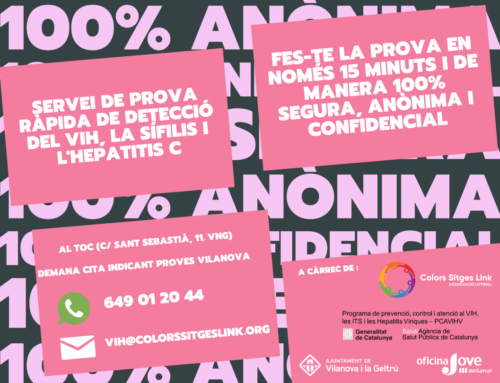The initiative aims to raise awareness of the importance of taking the test to detect if you have the disease and thus improve the diagnosis.
The screening, which is free and confidential, will take place on Balmins beach on 9, 10 and 11 September from 11 am to 2 pm and on 9 and 10 September on Passeig de la Ribera from 7.30 pm to 9.30 pm.
Sitges is hosting a hepatitis C (HCV) screening with the aim of detecting people at an early stage of the disease. It is a fast, free and confidential saliva test, which determines in just 20 minutes if you have been in contact with the virus, i.e. the presence of antibodies against the virus. More than 300 people are expected to take part in the screening.
The tests will take place on Balmins beach on 9, 10 and 11 September from 11 am to 2 pm, and on 9 and 10 September on Passeig de la Ribera (near the Bear Village) from 7.30 pm to 9.30 pm.
In parallel, at the association Colors Sitges Link (c/Joan Tarrida, 1), which usually offers these tests confidentially and free of charge, tests will also be offered on 7, 8 and 9 September, from 5 to 8 pm, and also on Saturdays 3 and 10 September, from 12 to 8 pm. To take part in this screening, appointments can be made by calling 649 012 044.
Hepatitis C is transmitted by blood and a positive result does not always indicate active disease. Up to 25-35% of individuals have spontaneously cleared the virus and only have antibodies to the hepatitis C virus. Therefore, in cases where the antibody test is positive, a second test will be offered to determine whether the hepatitis C virus is active. This second test is performed by taking a drop of blood from the finger. In the case of a positive result, the medical team will be responsible for communicating the result to the persons concerned, by means of a report, by e-mail or by SMS, in a confidential manner.
The initiative is organised by the Digestive and Internal Medicine departments of the Sant Camil Hospital with the support of the LGTBIQ+ Colors Sitges Link association, Sitges Town Council, the Catalan Public Health Agency’s HIV, STI and HIV Prevention, Control and Care Programme (PCAVIHV), the Vall d’Hebron University Hospital’s Hepatology Service and the Red Cross. In addition, the study is funded through a grant offered by Gilead Sciences and is sponsored by the Spanish Society for the Study of the Liver (AEEH).
Hepatitis C
Hepatitis C is an infectious disease that exclusively affects the liver and is caused by the hepatitis C virus, or HCV. There is no vaccine to prevent it, but there is treatment.
Most people affected by the disease have no symptoms and 10-15% show physical and mental fatigue or a feeling of weakness and yellowing of the skin and eyes. Infected people progress to asymptomatic chronic hepatitis C, although in some cases they may develop cirrhosis and, more rarely, liver cancer.
The World Health Organisation (WHO) has set as one of its goals the elimination of hepatitis C by 2030. According to the organisation, there are currently between 130 and 150 million people infected with the hepatitis C virus worldwide. Hepatitis C is the most common liver infection in Europe and one of the main causes of liver transplants in Catalonia.
Sitges Town Council press release










